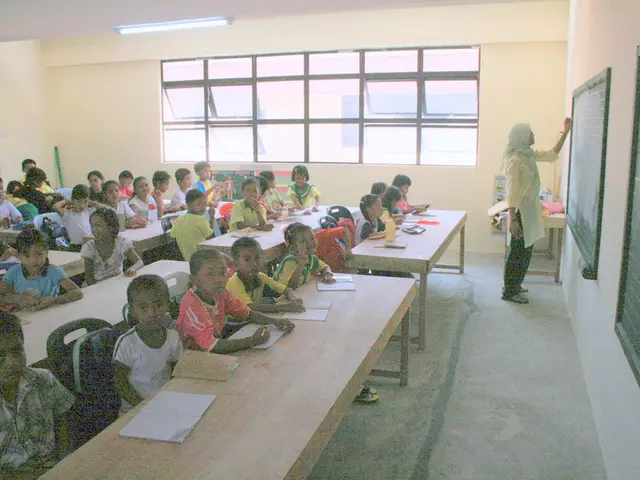Delving into Existentialism's Educational Objectives
In the realm of education, a philosophical shift has taken place, moving away from traditional, standardized models towards a more personal and meaningful approach. This evolution is known as existentialist education, a philosophy that emphasizes individual choice, freedom, and responsibility.
Søren Kierkegaard, often hailed as the father of existentialism, underscored the importance of individual faith and the struggle for authentic existence. His ideas laid the groundwork for a new educational philosophy that values personal experience, critical questioning, and the cultivation of self-awareness.
Existentialist education seeks to develop individuals who question, explore, and define their own purpose, rather than producing students who merely follow societal norms. It encourages learners to take ownership of their decisions and learning processes, recognising their role in shaping their existence and future.
Friedrich Nietzsche, another influential existentialist philosopher, rejected traditional morality and argued that individuals must create their own values. This principle is reflected in existentialist education, which values personal experience and critical questioning, encouraging students to take responsibility for their learning and decisions.
Simone de Beauvoir extended existentialist thought to feminism, highlighting the role of choice in shaping identity. Her work underscored the importance of individual freedom and personal responsibility in shaping one's life and destiny.
The key principles of existentialist education include fostering authenticity, encouraging personal responsibility, promoting individual freedom, and developing critical thinking. Education supports students in exploring their unique identity and purpose in life, while challenging them to think deeply about their values, beliefs, and the consequences of their actions.
Unlike more rigid, teacher-centered philosophies such as essentialism, existentialist education is student-centered, promoting active engagement and self-reflection. It sees each student as a unique, autonomous being, emphasizing the creation of personal meaning within the learning experience rather than simply absorbing external knowledge.
In sum, existentialist education empowers learners to navigate and create meaning in an uncertain, changing world through authenticity, freedom, responsibility, and critical thought. By fostering self-awareness, personal responsibility, and critical thinking, it equips students with the tools they need to shape their own lives and make informed decisions.
- Søren Kierkegaard's ideas in existentialism emphasized individual faith and the struggle for authentic existence, which form the basis of a new educational philosophy focusing on personal experience, critical questioning, and self-awareness.
- Within the confines of existentialist education, students are encouraged to question, explore, and define their own purpose, moving away from conforming to societal norms.
- Friedrich Nietzsche's rejection of traditional morality can be seen in existentialist education, as it values personal experience, critical questioning, and the creation of one's own values.
- Simone de Beauvoir's extension of existentialist thought to feminism highlights the role of choice in shaping identity and the importance of personal freedom and responsibility in shaping one's life and destiny.
- Key principles of existentialist education include fostering authenticity, encouraging personal responsibility, promoting individual freedom, and developing critical thinking.
- Education within this philosophy supports students in exploring their unique identity and purpose in life, challenging them to think deeply about their values, beliefs, and the consequences of their actions.
- Unlike traditional, teacher-centered philosophies, existentialist education is student-centered, promoting active engagement, self-reflection, and the creation of personal meaning within the learning experience.
- By fostering self-awareness, personal responsibility, and critical thinking, existentialist education equips students with the tools to navigate an uncertain, changing world, thereby empowering them to shape their own lives and make informed decisions.





